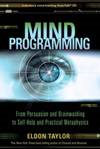Mind Programming: From Persuasion and Brainwashing to Self-Help and Practical Metaphysics; (c) 2009 by Eldon Taylor.
This book portrays the subtle and aggregate power of advertising and messaging that occurs throughout our environment. Taylor stresses that advanced psychology and neurology are applied in the fields of persuasion and advertising. The second part of the book focuses on how the susceptibility to such messaging might also be used to improve our internal makeup and make us more conscious of our choices.
The book is interesting reading in that most of the effects will seem subtle and almost too slight to be concerned with. However, when you consider that you are bombarded by these messages and techniques since your early verbal and conceptional development, the effects seem very substantial. Even if 99.99% of the subtle advertising messages fail to move your wiring, the effect over time can undermine your conscious choices and give you propensities you would not otherwise choose. The book also points out that many of the messages are not harmless product messages, but may exaggerate clearly undesired thought patterns that just happen to support the product in question.
I agree in overall effects with the author, but personally believe the subconscious is less an out-of-awareness simplified rationality and in greater part established highways in the mind that act relatively autonomously. As the author points out, this is a classic chasm in theories of behavior going back to the time of Freud and James. Whether the subconscious ‘thinks’ in some way or is action based on pure wiring is more theoretical, as we clearly see the effects of non-conscious predisposition and influences.
I find the book to be an aggregation of a wide range of pre-existing information. However, I find it makes many good references and is a worthwhile and a skillful aggregation. Taylor’s suggestion of the possible depth and breadth of large scale mind programming effects over a few chapters is nicely told and gives the reader an awareness of how powerful these effects be. You could debate whether the actions are mostly deliberate and planned or more Darwinian/economic in nature, with influential and persuasive practices thriving by default, but in either case you end up with a powerful ecosystem that exerts enormous and often concentrated control over society.
In summary, excellent and worthwhile reading.

